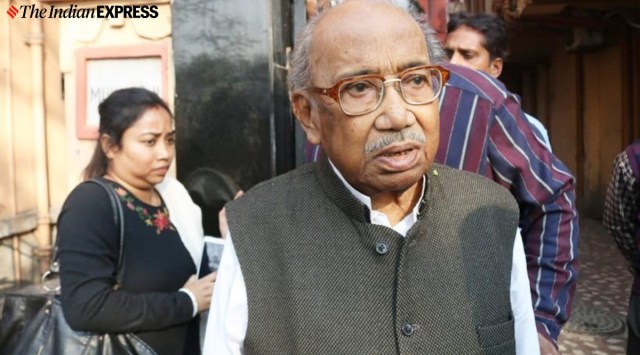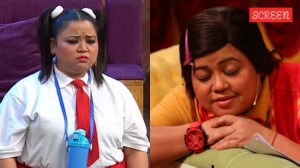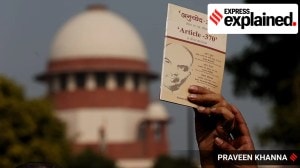Click here to follow Screen Digital on YouTube and stay updated with the latest from the world of cinema.
Tarun Majumdar, whose family entertainers are loved by all, dies at 92
With his passing away at SSKM hospital at 11.17 am on Monday, following prolonged illness, cinema has lost a great storyteller who made many heartwarming family entertainers. He was 92.
 Tarun Majumdar was 92. (Photo: Express Archives)
Tarun Majumdar was 92. (Photo: Express Archives)Writer-director Tarun Majumdar occupies a unique position in Indian cinema for deftly blending aesthetics of ‘art-house’ cinema with the tropes of mainstream fare to make movies that entertained the masses as well as the hard-nosed audience. With his passing away at SSKM hospital at 11.17 am on Monday, following prolonged illness, cinema has lost a great storyteller who made many heartwarming family entertainers. He was 92.
Majumdar, a four-time National Award winner and Padma Shri recipient, was born on January 1, 1931, in Bogra (now in Bangladesh). He was the son of a freedom fighter. He studied at Kolkata’s Scottish Church College and was known to be an avid follower of the Leftist ideology. In his career spanning six decades, he made nearly 40 movies, and prominent among them are Balika Badhu (1967), Kuheli (1971), Ganadevata (1979), Dadar Kirti (1980), Bhalobasa Bhalobasa (1985), and Alo (2003).
“In Bengal, Majumdar represented what we know as the middle-of-the-road movies. There were acclaimed directors such as Satyajit Ray, Ritwik Ghatak and Mrinal Sen who were at the top of the heap. Then, there were those who made popular commercial movies, which used to be very good too. The space between these two streams of filmmaking was occupied by directors such as Majumdar and Tapan Sinha. The audience came in droves to watch Majumdar’s movies. They left the cinema hall with a sense of aesthetics and a certain kind of culturally rich ideas – which were often embedded in his movies,” says actor Joy Sengupta, who was introduced to Majumdar’s cinema Sriman Prithviraj (1973). The actor considers this to be “the best coming-of-age movie” he has watched as it combined the story of family dynamics with that of the independence movement.
Majumdar depicted rural life with warmth and celebrated their way of living. This, according to director Sagnik Chatterjee, is remarkable about Majumdar’s movies. “Majumdar told stories set in rural India with compassion and sophistication which appealed to audiences across sections. In fact, he made one successful movie after another on varied subjects without depending on stars,” said the maker of Feluda: 50 Years of Ray’s Detective. His movies were also popular for their enduring characters and evergreen music.
Majumdar cast popular stars such as Uttam Kumar and Suchitra Sen only in a few of his films while he worked with the then newcomers such as Moushumi Chatterjee, Tapas Paul, Debashree Roy and Mahua Roychowdhury. Chatterjee, who counts Sansar Seemantey (1975), Palatak (1963), Fuleswari (1974) as his favourite movies by Majumdar, finds “the use of Rabindra Sangeet with a contemporary touch” in a number of his movies impressive.
What Sengupta found heartwarming in Majumdar’s movies is the portrayal of his main characters, who often exhibited a certain “innocence” while negotiating with life. “His characters were seldom crude or negative. His movies were full of characters who were happy, joyful and good-at-heart. Yet, his movies nudged the audience to think. That was his triumph,” says the Hazaar Chaurasi Ki Maa actor. Majumdar is known for his excellent screen adaptation of literary classics by Tarasankar Bandyopadhyay, Saradindu Bandyopadhyay and Bimal Kar.


Photos
- 01
- 02
- 03
- 04
- 05































